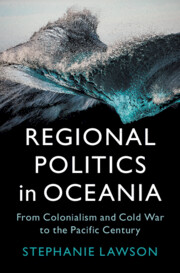Book contents
- Regional Politics in Oceania
- LSE International Studies
- Regional Politics in Oceania
- Copyright page
- Dedication
- Contents
- Preface
- Acknowledgements
- A Note on Sources and References
- Abbreviations
- Maps
- 1 Oceania and the Study of Regions
- 2 Demarcating Oceania
- 3 Colonizing Oceania
- 4 Regionalizing Oceania
- 5 Transformations in Regional Organization
- 6 Regionalism the ‘Pacific Way’
- 7 The Politics of Subregional Identity
- 8 The Forum in Regional Politics
- 9 Democracy and Culture in Regional Politics
- 10 The Spectre of Regional Intervention
- 11 The Political Economy of Regionalism
- 12 Geopolitics in the Pacific Century
- 13 Conclusion
- Select Bibliography
- Index
6 - Regionalism the ‘Pacific Way’
Published online by Cambridge University Press: 15 February 2024
- Regional Politics in Oceania
- LSE International Studies
- Regional Politics in Oceania
- Copyright page
- Dedication
- Contents
- Preface
- Acknowledgements
- A Note on Sources and References
- Abbreviations
- Maps
- 1 Oceania and the Study of Regions
- 2 Demarcating Oceania
- 3 Colonizing Oceania
- 4 Regionalizing Oceania
- 5 Transformations in Regional Organization
- 6 Regionalism the ‘Pacific Way’
- 7 The Politics of Subregional Identity
- 8 The Forum in Regional Politics
- 9 Democracy and Culture in Regional Politics
- 10 The Spectre of Regional Intervention
- 11 The Political Economy of Regionalism
- 12 Geopolitics in the Pacific Century
- 13 Conclusion
- Select Bibliography
- Index
Summary
This chapter focuses initially on the context within which Ratu Mara first articulated his notion of the Pacific Way, including his congenial relationship with the British colonial administration in Fiji. The next section examines another important articulation of the Pacific Way by an expatriate commentator, reflecting a much more critical approach to colonialism. But there is also a judicious appraisal of the Pacific Way’s Polynesian associations, something that compromised its ability to function as a pan-Pacific identity. Polynesian elite values are also implicated in an aversion to the adversarial nature of Western democratic politics. In (apparent) contrast, the Pacific Way is claimed to be based primarily on traditional modes of ‘consensus politics’. This issue is explored partly in comparative perspective, noting that the positing of consensus politics as an alternative to adversarial (Western) democracy has often been deployed in other post-colonial settings as a culturally more authentic expression of local political values.
Keywords
- Type
- Chapter
- Information
- Regional Politics in OceaniaFrom Colonialism and Cold War to the Pacific Century, pp. 142 - 171Publisher: Cambridge University PressPrint publication year: 2024



